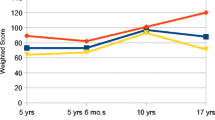Abstract
Neuropsychological impairment after removal of posterior fossa tumors is a recurrent issue in child neuropsychology and neurosurgery. The aim of this study was to assess verbal and performance intelligence, as well as immediate and sustained attention, in children with medulloblastoma or astrocytoma operated on for total removal of the lesion. Surgical treatment of medulloblastoma was always followed by chemoradiotherapy. Siblings of both tumor groups (without a history of neurological disease, even suspected) were examined as controls. The results were as follows: the cognitive performances were significantly poorer than the controls in both groups; the children with medulloblastoma scored below normal. Attention deficits were present in both groups as well when the usual clinical tests were used. When assessed by means of computerized methodology, the same function was normal. Considering that both groups of children underwent the same surgical treatment and all had hydrocephalus, the severe intellectual impairment reported only in patients with medulloblastoma can be ascribed to chemoradiotherapy. In contrast, the attention deficits present in both groups could be ascribed to the proximity of lesions to the ascending activating system. Malfunctioning of the activating system seems to be bypassed by the computerized administration of stimuli, which supplies motivation and kindles attention.
Similar content being viewed by others
References
Bamford FN, Morris Jones P, Pearson D, Ribeiro GG, Shalet SM, Beardwell CG (1976) Residual disabilities in children treated for intracranial space-occupying lesions. Cancer 37:1149–1151
Brodal A (1979) Neurological anatomy in relation to clinical medicine, 3rd edn. Oxford University Press, Oxford
Brouwers P, Riccardi R, Poplack D, Fedio P (1984) Attentional deficits in long-term survivors in childhood ALL. J Clin Neuropsychol 3:325–336
Chin HW, Maruyama Y (1984) Age at treatment and long-term performance results in medulloblastoma. Cancer 53:1952–1958
Danoff BF, Cowchock FS, Marquette C, Mulgrew L, Kramer S (1982) Assessment of the long-term effects of primary radiation therapy for brain tumors in children. Cancer 49:1580–1586
Dennis M, Hendrick E, Joffman HG, Humphreys RP (1987) Language in hydrocephalic children and adolescents. Clin Exp Neuropsychol 9:593–621
Duffner PK, Cohen ME, Thomas P (1983) Late effects of treatment on the intelligence of children with posterior fossa tumors. Cancer 51:233–237
Eiser C (1978) Intellectual abilities among survivors of childhood leukemia as a function of CNS irradiation. Arch Dis Child 53:391–395
Fossati Bellani F, Gasparini M, Lombardi F, Zucali R, Luccarelli G, Migliavacca F, Moise A, Nicola G (1984) Medulloblastoma: results of a sequential combined treatment. Cancer 54:1956–1961
Hirsch JF, Renier D, Czernichow P, Benveniste L, Pierre-Khan A (1979) Medulloblastoma in childhood. Survival and functional results. Acta Neurochir (Wien) 48:1–15
Kun LE, Mulhern RK, Crisco JJ (1983) Quality of life in children treated for brain tumors. J Neurosurg 58:1–6
Mulhern RK, Kun LE (1985) Neuropsychologic function in children with brain tumors. III. Interval changes in the six months following treatment. Med Pediatr Oncol 13:318–324
Papert S (1980) Mind storms: children, computers and powerful ideas. Basic Books, New York
Raimondi AJ, Tomita T (1979) Advantages of “total” resection of medulloblastoma and disadvantages of full head postoperative radiation therapy. Child's Brain 5:550–551
Riva D, Fossati Bellani F, Nardin E, Pantaleoni C, Milani N (1986) Combined treatment modality for childhood medulloblastoma: deficits in intelligence, attention and memory. Abstracts of the XVIII Meeting of the International Society of Pediatric Oncology, Belgrade, September 15–20, 1986, p 65
Robison LL, Nesbit ME, Sather HN, Meadows AT, Ortega JA, Denman Hammond J (1984) Factors associated with IQ scores in long-term survivors of childhood acute lymphoblastic leukemia. J Pediatr Hematol Oncol 6:115–121
Rowland J, Glidewell O, Sibley R, Holland JC, Brecher ML, Tull B, Berman A, Glicskman A, Forman E, Harris M Jones, Cohen ME, Duffner PK, Freeman A (1984) Effects of different forms of CNS prophylaxis of neuropsychologic function in childhood leukemia. J Clin Oncol 2:1327–1335
Silverman CL, Palkes H, Talent B, Kovnar E, Clouse JW, Thomas PRM (1984) Late effects of radiotherapy on patients with cerebellar medulloblastoma. Cancer 54:825–829
Author information
Authors and Affiliations
Rights and permissions
About this article
Cite this article
Riva, D., Pantaleoni, C., Milani, N. et al. Impairment of neuropsychological functions in children with medulloblastomas and astrocytomas in the posterior fossa. Child's Nerv Syst 5, 107–110 (1989). https://doi.org/10.1007/BF00571120
Received:
Issue Date:
DOI: https://doi.org/10.1007/BF00571120



